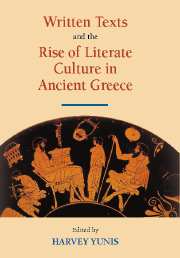Book contents
- Frontmatter
- Contents
- Preface
- Contributors
- Introduction: Why Written Texts?
- 1 From Letters to Literature: Reading the “Song Culture” of Classical Greece
- 2 Writing Religion: Inscribed Texts, Ritual Authority, and the Religious Discourse of the Polis
- 3 Letters of the Law: Written Texts in Archaic Greek Law
- 4 Writing, Law, and Legal Practice in the Athenian Courts
- 5 Literacy and the Charlatan in Ancient Greek Medicine
- 6 Literacy in Greek and Chinese Science: Some Comparative Issues
- 7 Writing Philosophy: Prose and Poetry from Thales to Plato
- 8 Prose Performance Texts: Epideixis and Written Publication in the Late Fifth and Early Fourth Centuries
- 9 Writing for Reading: Thucydides, Plato, and the Emergence of the Critical Reader
- 10 Reflecting on Writing and Culture: Theocritus and the Style of Cultural Change
- Bibliography
- Index
6 - Literacy in Greek and Chinese Science: Some Comparative Issues
Published online by Cambridge University Press: 30 July 2009
- Frontmatter
- Contents
- Preface
- Contributors
- Introduction: Why Written Texts?
- 1 From Letters to Literature: Reading the “Song Culture” of Classical Greece
- 2 Writing Religion: Inscribed Texts, Ritual Authority, and the Religious Discourse of the Polis
- 3 Letters of the Law: Written Texts in Archaic Greek Law
- 4 Writing, Law, and Legal Practice in the Athenian Courts
- 5 Literacy and the Charlatan in Ancient Greek Medicine
- 6 Literacy in Greek and Chinese Science: Some Comparative Issues
- 7 Writing Philosophy: Prose and Poetry from Thales to Plato
- 8 Prose Performance Texts: Epideixis and Written Publication in the Late Fifth and Early Fourth Centuries
- 9 Writing for Reading: Thucydides, Plato, and the Emergence of the Critical Reader
- 10 Reflecting on Writing and Culture: Theocritus and the Style of Cultural Change
- Bibliography
- Index
Summary
Work done in the wake of the pioneering studies of Goody and Watt, Havelock, and others has put on the agenda a series of evidently crucial, if highly obscure, questions. If we can all agree that the existence of written records and other types of texts makes a difference, the issue is: what difference? The key questions include: who is in control; who makes the texts; who has access to them; who uses them; and for what purposes? How are those who do the writing recruited and trained? How and by whom is the ability to read them acquired? Who is responsible for the transmission and dissemination of texts or for deciding which texts are for more general, which for only restricted, circulation? What, indeed, did “circulation” consist of, and what, more generally, were the occasions on which the texts were used or their contents performed? We shall certainly not be in a position to appreciate the differences literacy makes in a given society at a given period until we have some idea about the answers to questions like those – not that that list is meant to be exhaustive. To get a sense of those differences, we need, ideally, to take a range of different societies and periods into account: we need, in fact, a comparative approach.
Let me explain my agenda. What were the different effects, on ancient Chinese and Greek science, of the modes of literacy for which we have evidence?
- Type
- Chapter
- Information
- Written Texts and the Rise of Literate Culture in Ancient Greece , pp. 122 - 138Publisher: Cambridge University PressPrint publication year: 2003
- 1
- Cited by



